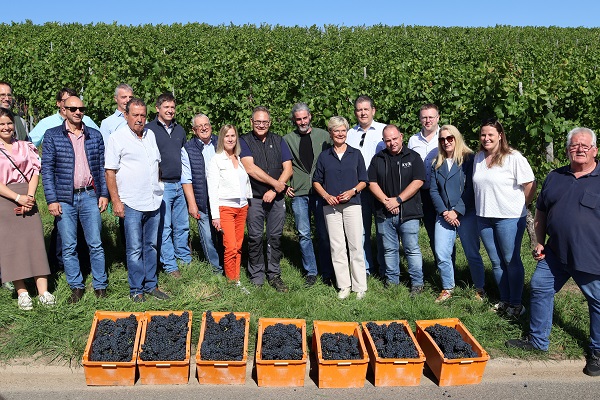 Martine Hansen, Minister of Agriculture, Food & Viticulture, together with representatives of the Wine Institute, Domaines Vinsmoselle, Privatwenzer Letzebuerg ASBL, Luxembourg Wine & Spirits Federation, Chamber of Agriculture and ORT Moselle;
Credit: MA
Martine Hansen, Minister of Agriculture, Food & Viticulture, together with representatives of the Wine Institute, Domaines Vinsmoselle, Privatwenzer Letzebuerg ASBL, Luxembourg Wine & Spirits Federation, Chamber of Agriculture and ORT Moselle;
Credit: MA
On Thursday 18 September 2025, Luxembourg's Minister of Agriculture, Food and Viticulture, Martine Hansen, took part in this year's grape harvest in Ehnen, in the Moselle region.
Accompanied by representatives of the Wine Institute (IVV), Domaines Vinsmoselle, the non-profit organisation "Privatwenzer Letzebuerg" and the Luxembourg Wine and Spirits Federation (FLVS), Minister Hansen "praised the commitment of an entire industry focused on a particularly promising 2025 vintage".
According to Luxembourg's Ministry of Agriculture, Food and Viticulture, 2025 will be remembered as one of the most favourable years in the last decade for Luxembourg viticulture. Thanks to a mild spring, a sunny summer and well-distributed rainfall, the grapes were able to ripen in near-ideal conditions. The harvested bunches are healthy and display "a beautiful aromatic concentration".
"This 2025 vintage is a gift from nature. It reflects the meticulous work of our winegrowers and the generosity of this year's climate. We can expect elegant, balanced and expressive wines, worthy of the reputation of our terroir," said Martine Hansen.
Her ministry added that the harvest in Ehnen, as throughout the Moselle Valley, also "embodies a moment of sharing, transmission and collective pride". Every year, hundreds of seasonal workers, enthusiasts and volunteers help winegrowers harvest the grapes.
Minister Hansen took advantage of this day to discuss with industry professionals the outlook for Luxembourg viticulture, the challenges of promoting local wines and sustainability efforts. At the end of a morning of discussions, she said: "I wish everyone a wonderful harvest and a high-quality crop. May this season be marked by the success, solidarity and passion that drive our vineyards. The 2025 vintage promises to be exceptional, and I am convinced that it will reflect the expertise, commitment and love of our winegrowers' craft."
Minister Hansen also reiterated the importance of supporting viticulture that combines tradition, innovation and respect for the environment: "Our wines and crémants are much more than agricultural products. They are the fruit of ancestral know-how, but also of a constant capacity for adaptation. They embody the cultural identity of our country and deserve our full attention."
The Agriculture Ministry noted that the IVV, based in Remich, plays a central role in the development of Luxembourg viticulture. It provides applied research, technical consulting, oenological analysis and continuing education. The IVV is also a key player in adapting the vineyard to climatic and economic challenges, particularly through the introduction of resilient grape varieties and the promotion of sustainable practices.
The ministry described cooperation between the IVV and the three professional associations - Domaines Vinsmoselle, Privatwënzer Lëtzebuerg and the FLVS - as "exemplary", noting that they work together "to promote the Luxembourg terroir, improve product quality and defend the interests of the wine sector."
In terms of harvest preparation, this year ADEM organised "Job Days" at the request of wineries - individually, for each interested estate. According to the ministry, this approach has proven effective, better meeting the concrete needs on the ground and improving coordination.
During her visit, Minister Hansen also presented the latest data on the structure of Luxembourg's vineyards. The total cultivated area in 2025 was 1,188 hectares. The most cultivated grape varieties were:
- Rivaner (210 ha)
- Pinot Gris (191 ha)
- Auxerrois (177 ha)
- Pinot Blanc (159 ha)
- Riesling (approx. 156 ha)
- Pinot Noir (132 ha), showing strong growth
- Chardonnay (61 ha), which has quadrupled its area in 20 years
Luxembourg's vineyards rely on a diversity of economic models: 43% of the area is cultivated by members of wine cooperatives, 37% by independent winegrowers and 20% by merchants and contract winegrowers.
In Ehnen itself, eight farms cultivate more than 50 hectares.








